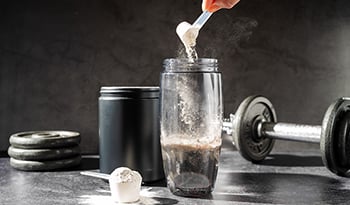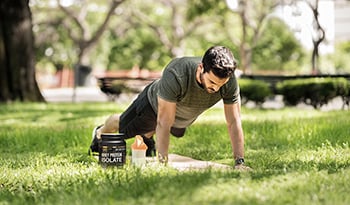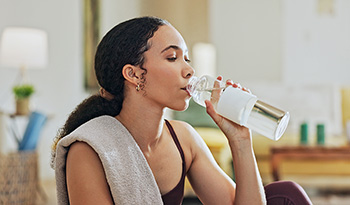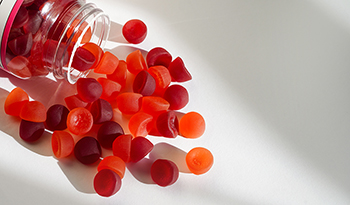Creatin Women For: 5 Hours Előny
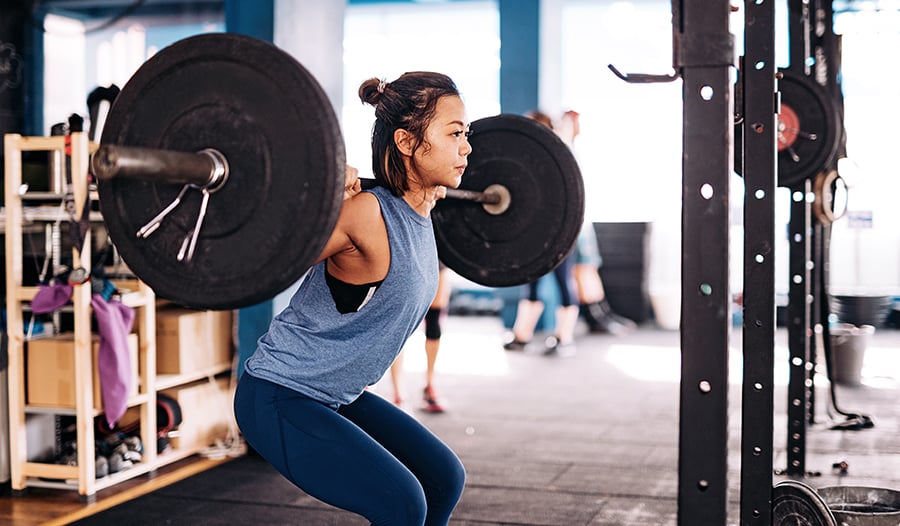
Eredetileg feltöltve 2024 augusztusában/Frissítve 2025. februárban
Kreatin az egyik legnépszerűbb étrend-kiegészítő. Használata azonban történelmileg népszerűbb volt a férfiak körében. Ez változik, mivel minden korosztály egyre több nő fedezi fel a kreatin számos egészségügyi előnyét, beleértve az izmok egészségét és a testmozgást, az öregedésgátló hatásokat, valamint a hangulatra, az agyműködésre, az életminőségre és a szív egészségére gyakorolt jótékony hatásokat. Valójában a kutatások azt mutatják, hogy a nők jobban profitálhatnak a kreatin-kiegészítésből, mint a férfiak.1
Mi a kreatin?
A kreatin egy természetesen előállított vegyület a szervezetben. Az arginin, glicin vagy metionin aminosavakból készül. Egy átlagos ember testében körülbelül 120 gramm kreatin van, de főleg kreatin-foszfátként akár 160 grammot is képes tárolni. A szervezet kreatinjának nagy része a vázizomban tárolódik. Kis mennyiségű kreatin megtalálható az agyban, a szívben, a herékben és más szervekben is.
Mit csinál a kreatin?
A kreatin-foszfát fő testfunkciója az izmok energiatermelésének fokozása a gyors teljesítmény és sebesség elérése érdekében, de fontos az agy működéséhez is. Amikor egy izomsejt összehúzódik, energiára van szükség, amelyet az adenozin-trifoszfátból (ATP) egy foszfátcsoport felszabadulásával termel, amely aztán adenozin-difoszfáttá (ADP) alakul át. A kreatin-foszfát adományozza foszfátcsoportját, hogy az ADP-t ATP-vé alakítsa vissza, lehetővé téve annak, hogy felszabadítsa a kreatin-foszfát által energiaként adományozott foszfátcsoportot.
A kreatinin-foszfát energiatermelő hatása más szövetekben is előfordul, különösen az agyban és a szívben. Valójában az agynak van a legnagyobb energiaigénye minden testszövet közül. Bármely sejt energiaszintjének növelése növeli annak működését. És ez fontos cél az általános egészség javításában. A sejtek energiájának növelésében betöltött szerepe mellett a kreatin antioxidáns, gyulladáscsökkentő és immuntámogató hatást fejt ki.2
A kreatin egészségügyi előnyei a nők számára
A nők jobban profitálhatnak a kreatin-kiegészítésből, mint a férfiak, mivel a nők 70— 80% -kal alacsonyabb a kreatinszintje a testükben, mint a férfiaknál, beleértve az agyat is. A kreatinnal történő kiegészítés növeli a kreatin-foszfát test- és agyi készleteinek növekedését, amely a kreatin aktív formája.
Kimutatták, hogy a kreatin javítja az atlétikai teljesítményt, növeli az erőt és támogatja az izomnövekedést. Ezek a hatások jól ismertek, de számos további egészségügyi előnye van a nők számára, amelyek nem annyira ismertek.1 Íme a kreatin-kiegészítés 5 legfontosabb egészségügyi előnye a nők számára.
1. A kreatin javíthatja a nők testmozgási teljesítményét
A kreatin hozzájárul a sejtek gyors energiatermeléséhez, hogy fokozza a rövid anaerob testmozgás vagy aktivitás során szükséges erő vagy sebesség kitörését. A kreatin segít az izmoknak a glikogén, a glükóz (vércukor) tárolási formájának tárolásában is. Az anaerob testmozgás során a glikogén glükózzá alakul, amelyet ezután energiára égetnek. Ez segíthet az atlétikai teljesítményben, különösen rövid, ismételt anaerob tevékenységek esetén, például a súlyemeléshez, a sprinthez, a cross-fithez és sok sporthoz szükségesek. A kreatin segíti az izmok edzés utáni helyreállítását is, mivel a gyógyuláshoz glükózból származó energiára van szükség.1-5
2. A kreatin segíthet a nőknek a sovány izomtömeg felépítésében
Fontos megjegyezni, hogy a kreatin-kiegészítés önmagában nem építi az izmokat, ezt kombinálni kell ellenállási edzéssel, például súlyemeléssel vagy olyan gyakorlatokkal, amelyek ellenállásként a testsúlyt használnak. A rendszeres rezisztencia-edzés, a megfelelő fehérjebevitel és a kreatin-kiegészítés kombinációja segíthet a nőknek a sovány izomtömeg felépítésében.1,6,7 Mivel azonban a nőknek nincs a magas tesztoszteron további izomelősegítő hatása, az izomtömeg növekedésének mértéke nem azonos a férfiakkal.
Amikor a kreatin-kiegészítést férfiaknál testsúly- vagy rezisztencia-edzéssel kombinálták, életkortól függetlenül, átlagosan 1,46 kg (3,2 font) növekedést eredményezett, míg nőknél ez a növekedés lényegesen kevesebb volt, 0,29 kg (0,6 font).7 Ez még mindig jelentős növekedés a nőknél.
3. A kreatin segíthet a nőknek megelőzni az életkorral összefüggő izom-, erő- és csont elvesztését
A kreatin-kiegészítés fontos szempont az életkorral összefüggő szarkopénia, az izomtömeg- és funkcióvesztés ellen, amely az öregedéssel történik. A kreatin-kiegészítés posztmenopauzális nőknél jobb izomerőt és megnövekedett izomtömeget eredményez. Csökkenti a gyulladás, az oxidatív károsodás és a csontvesztés markereit is. A kreatin-kiegészítés rezisztencia-edzéssel kombinálva javítja mind az izom-, mind a csontok egészségét a posztmenopauzális nők számára. Mindezek a kutatások azt mutatják, hogy a kreatin-kiegészítés fontos kiegészítője az étrendnek és a testmozgásnak abban, hogy segítsen a nőknek megőrizni az izomtömeget és a csontsűrűséget az életkor előrehaladtával.1,8-10
4. A kreatin javíthatja a nők hangulatát és mentális egészségét
Mivel az agyi energia magasabb szintje pozitívabb hangulati pontszámokhoz és jobb mentális funkcióhoz kapcsolódik, a kreatin képessége az agyi energia anyagcseréjének fokozására azt sugallja, hogy előnyökkel járhat ezeken a területeken. Kutatások kimutatták, hogy a kreatin-kiegészítés fokozza az agyi energiatermelést az agy kulcsfontosságú területein, és képes javítani a szorongás vagy a stressz érzését, a hangulatot és a mentális fáradtságot a nők körében.1,8-13
Nagyon értelmes, hogy a kreatin megmutatja ezeket az előnyöket, mivel az agynak jelentős mennyiségű ATP-re van szüksége több feladat elvégzéséhez. A kreatin-kiegészítés növeli az agy foszfokreatinszintjét, ami viszont fokozott ATP-képződéshez vezet, amely az agy működésének támogatásához szükséges.
A nő agya érzékenyebb lehet az alacsony kreatinszintekre, mivel az eredmények azt mutatják, hogy a nők agyi kreatinszintje alacsonyabb a férfiakhoz képest, különösen a frontális lebenyben, az agy azon területén, amely szabályozza az érzelmeket, a hangulatot, a megismerést és a memóriát.1 A kreatin-kiegészítés fokozza a frontális kéregre támaszkodó mentális feladatokat, például a tanulást, a memóriát és a figyelmet. Ezenkívül a mentális funkció életkorral összefüggő csökkenését a kreatin-kiegészítés is csökkentheti.10,13
Az összes adat lényege, hogy a kreatin-kiegészítés ugyanolyan pozitív hatást gyakorol a nők mentális egészségére, mint a fizikai egészségre.
5. A kreatin segíthet csökkenteni az öregedés jeleit a bőrön
A kreatin a bőr egészsége szempontjából is fontos, mivel fontos hozzájárul a bőrsejtek energiatermeléséhez. Az előzetes kutatások azt mutatják, hogy a kreatin-kiegészítés megvédi a bőrt a károsodástól, ezáltal megakadályozza a bőr rugalmasságának elvesztését, valamint a napkárosodás, finom vonalak és ráncok kialakulását.14 Az orális kiegészítés mellett sok arcöregedésgátló krém és lokális krém tartalmaz kreatin összetevőt, amely elősegíti a kollagén szintézisét, a bőr rugalmasságát, valamint csökkenti a finom vonalakat és ráncokat. Kimutatták, hogy a helyileg alkalmazott kreatin növeli a kollagéntermelést.15
Adagolás és megfontolások
A Nemzetközi Sporttáplálkozási Társaság napi 3-5 gramm kreatint javasol. Tanulmányok azt mutatják, hogy a nagyobb adag kreatinnal való feltöltése nem jár előnyökkel.2
A kreatin-monohidrát a leggyakrabban használt forma és a leggyakrabban vizsgált forma. Általában a leghatékonyabb formának tekintik. A kreatin-monohidrát 15— 40% -kal növelheti a foszfokreatin szintet a szervezetben.2
A kreatin-kiegészítőket általában por, kapszula vagy tabletta formájában veszik be. A porított forma a leggyakoribb a 3-5 grammos adagolási tartomány miatt. A kreatin szagtalan és íztelen, így ideális vízbe, gyümölcslébe vagy turmixba keverni anélkül, hogy megváltoztatná az ízét. Ami az időzítést illeti, az edzés utáni kreatin szedésének bizonyos előnyei lehetnek az izomtömeg és az erő javítása szempontjából.
Kreatin biztonságossága és mellékhatásai
A Nemzetközi Sporttáplálkozási Társaság arra a következtetésre jutott, hogy a kreatin biztonságos és jól tolerálható mind rövid, mind hosszú távú használat esetén. Ez a vélemény több mint ezer humán klinikai vizsgálaton alapul, amelyekben a résztvevők a csecsemőkortól az előrehaladott életkorig terjedő életkorban voltak. A kreatin az 1990-es évek óta is jelen van a piacon, több milliárd adag kreatinnal. A mellékhatásokról vagy a lehetséges mellékhatásokról szóló korábbi jelentéseket jól kontrollált humán klinikai vizsgálatokban cáfolták. Különösen a kreatin-monohidrát alkalmazása a kreatin más formáival szemben a kreatin legjobban tolerálható formája.16
A kreatin átmeneti súlygyarapodáshoz vezethet a nőknél. Ez a hatás azonban nem a testzsír növekedésének köszönhető, hanem annak, hogy a kreatin képessége segít az izmoknak több glikogén és víz tárolásában. Ez növelheti az izomtömeget, ami a teljes testtömeg növekedéséhez vezethet.
Referenciák:
- Smith-Ryan AE, Cabre HE, Eckerson JM, Candow Főigazgatóság. Kreatin-kiegészítés a nők egészségében: élettartam perspektívája. Tápanyagok. 2021 március 8; 13 (3): 877.
- Kreider RB, Stout JR. Kreatin az egészségben és a betegségekben. Tápanyagok. 2021 január 29; 13 (2): 447.
- Fernández-Landa J, Santibañez-Gutierrez A, Todorovic N, Stajer V., Ostojić SM. A kreatin-monohidrát hatása az állóképességre egy edzett populáció állóképességére: szisztematikus áttekintés és metaanalízis. Sports Med. 2023. május; 53 (5) :1017-1027.
- Wax B, Kerksick CM, Jagim AR és mtsai. Kreatin a testmozgáshoz és a sportteljesítményhez, gyógyulási megfontolásokkal az egészséges populációk számára. Tápanyagok. 2021 június 2; 13 (6): 1915.
- Forbes SC, Candow DG, Neto JHF és mtsai. Kreatin-kiegészítés és állóképességi teljesítmény: hullámok és sprintek a verseny megnyeréséhez. J Int Soc Sports Nutr. 2023. december; 20 (1): 2204071.
- Burke R, Piñero A, Coleman M és mtsai. A kreatin-kiegészítés és rezisztencia edzés kombinált hatása az izomhipertrófia regionális méréseire: szisztematikus áttekintés metaanalízissel. Tápanyagok. 2023. április 28; 15 (9): 2116.
- Delpino FM, Figueiredo LM, Forbes SC, Candow DG, Santos HO. Az életkor, a nem és a testmozgás típusának hatása a kreatin-kiegészítés hatékonyságára a sovány testtömegre: A randomizált klinikai vizsgálatok szisztematikus áttekintése és metaanalízise. Táplálkozás. 2022 Nov.
- Chilibeck PD, Candow DG, Landeryou T, Kaviani M, Paus-Jenssen L. A kreatin és a rezisztencia edzés hatása a csontok egészségére a posztmenopauzás nőknél. A Sci Sports Exerc. 2015; 47 (8) :1587-1595.
- Candow DG, Forbes SC, Chilibeck és mtsai. A kreatin-kiegészítés hatékonysága az izmok és a csontok öregedésére: Összpontosítás az esések megelőzésére és a gyulladásra. J Clin Med. 2019 április 11; 8 (4) :488.
- Forbes SC, Candow Főigazgatóság, Ferreira LHB, Souza-Junior TP. A kreatin-kiegészítés hatása az izom-, csont- és agyműködési tulajdonságokra idősebb felnőtteknél: narratív áttekintés. J Diet Suppl. 2022; 19 (3) :318-335.
- Roschel H, Gualano B, Ostojić SM, Rawson ES. Kreatin-kiegészítés és agy egészsége. Tápanyagok. 2021 február 10; 13 (2) :586.
- Juneja K, Bhuchakra HP, Sadhukhan S, Mehta I, Niharika A, Thareja S, Nimmakayala T, Sahu S. Kreatin-kiegészítés depresszióban: mechanizmusok, hatékonyság, klinikai eredmények és jövőbeli irányok áttekintése. Cureus. 2024. október 16; 16 (10): e71638.
- Xu C, Bi S, Zhang W, Luo L. A kreatin-kiegészítés hatása a felnőttek kognitív funkcióira: szisztematikus áttekintés és metaanalízis. Front Nutr. 2024 júl. 12; 11:1424972.
- Lenz H, Schmidt M, Welge V és mtsai. A kreatin-kináz rendszer az emberi bőrben: a kreatin védő hatása az oxidatív és UV-károsodások ellen in vitro és in vivo. J Invest Dermatol. 2005.
- Peirano RI, Achterberg V, Düsing HJ és mtsai. A kreatint, guaránát és glicerint tartalmazó arcápoló készítményből származó kreatin dermális penetrációja összefügg a férfiak hatékony ránctalanító és megereszkedésgátló hatásosságával. J Cosmet Dermatol. 2011 december; 10 (4): 273-81.
- Kreider RB, Kalman DS, Antonio J és mtsai. A Nemzetközi Sporttáplálkozási Társaság álláspontja: a kreatin-kiegészítés biztonságossága és hatékonysága a testmozgásban, a sportban és az orvostudományban. J Int Soc Sport Nutr. 2017; 14:18.
- Wax B, Kerksick CM, Jagim AR, Mayo JJ, Lyons BC, Kreider RB. Kreatin a testmozgáshoz és a sportteljesítményhez, gyógyulási megfontolásokkal az egészséges populációk számára. Tápanyagok. 2021; 13 (6) :1915.
FELELŐSSÉGKIZÁRÓ NYILATKOZAT:A jelen blognak nem célja diagnózis felállítása...

















































































 Tartalomjegyzék
Tartalomjegyzék





